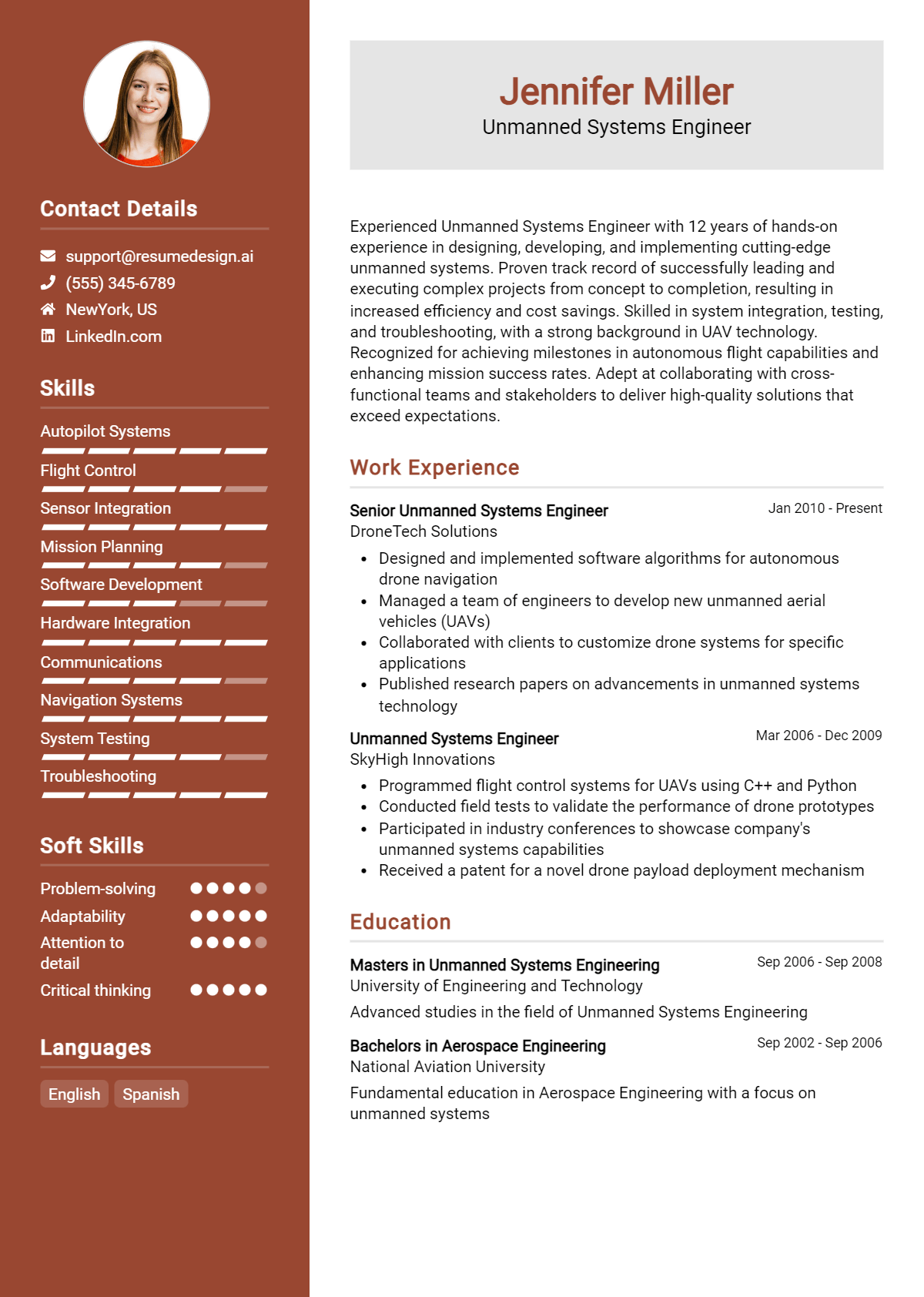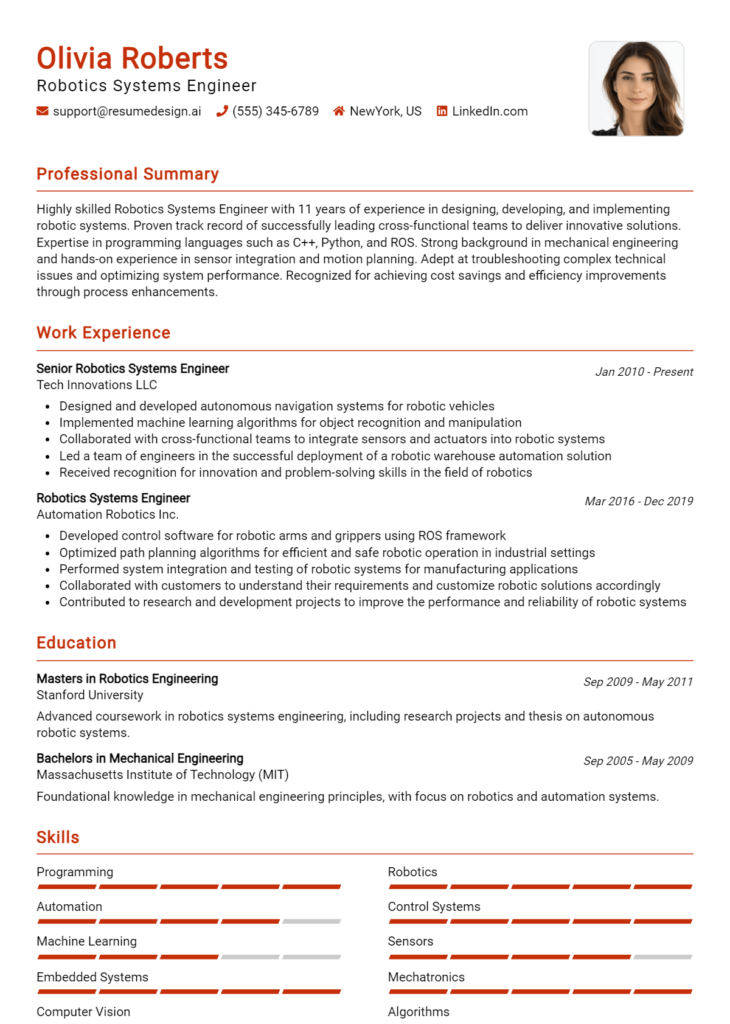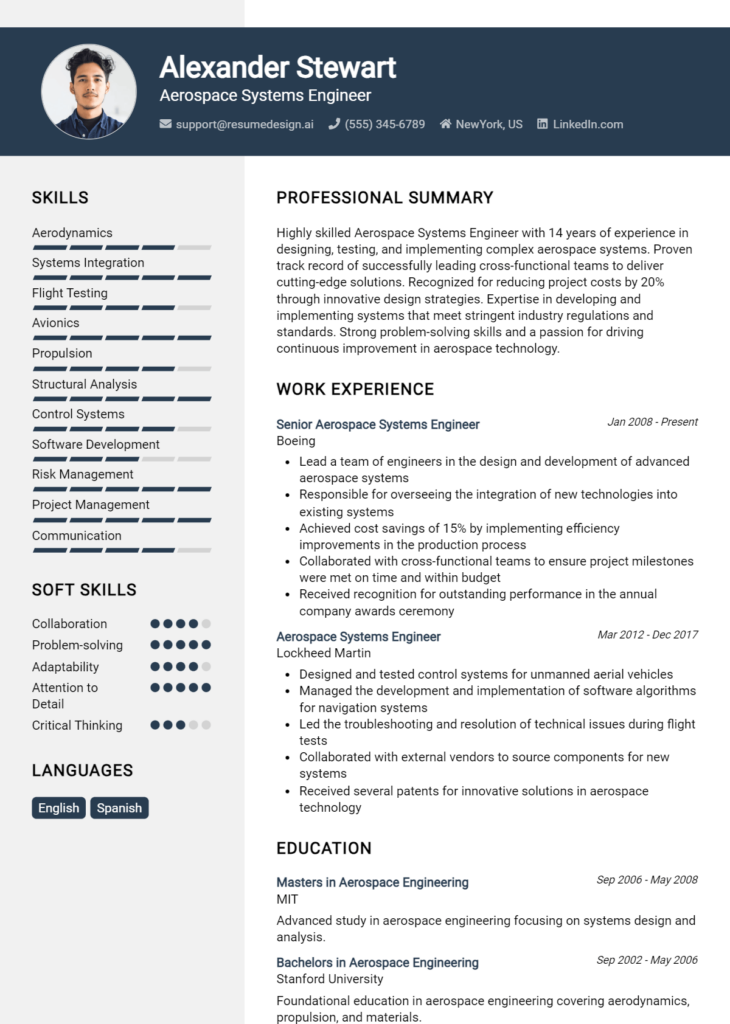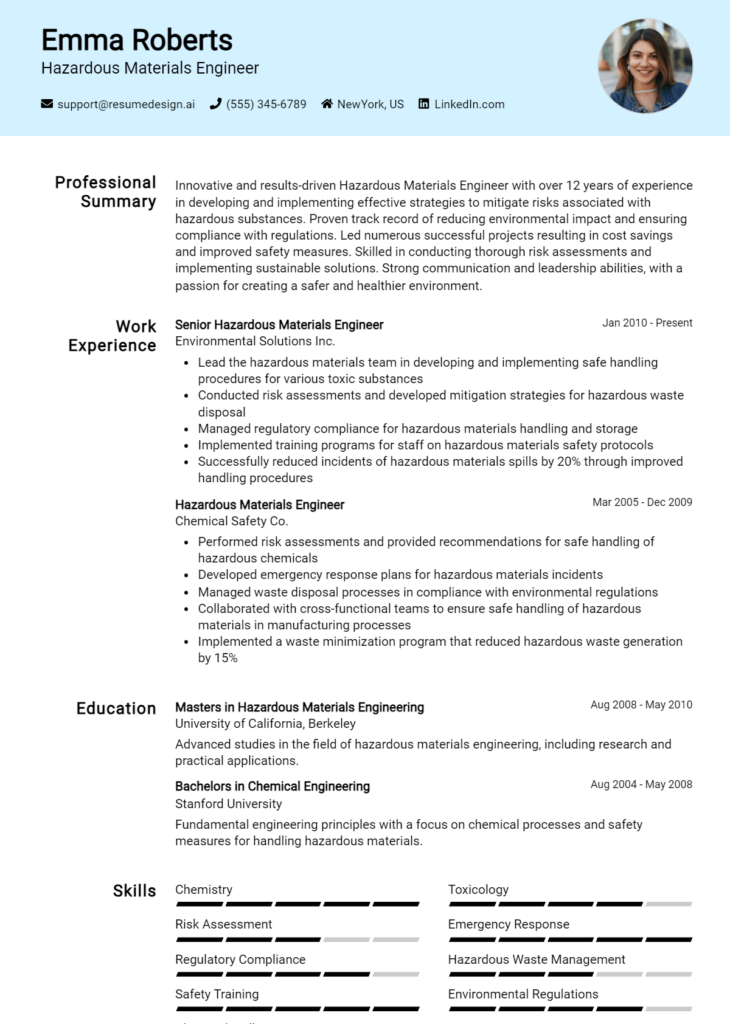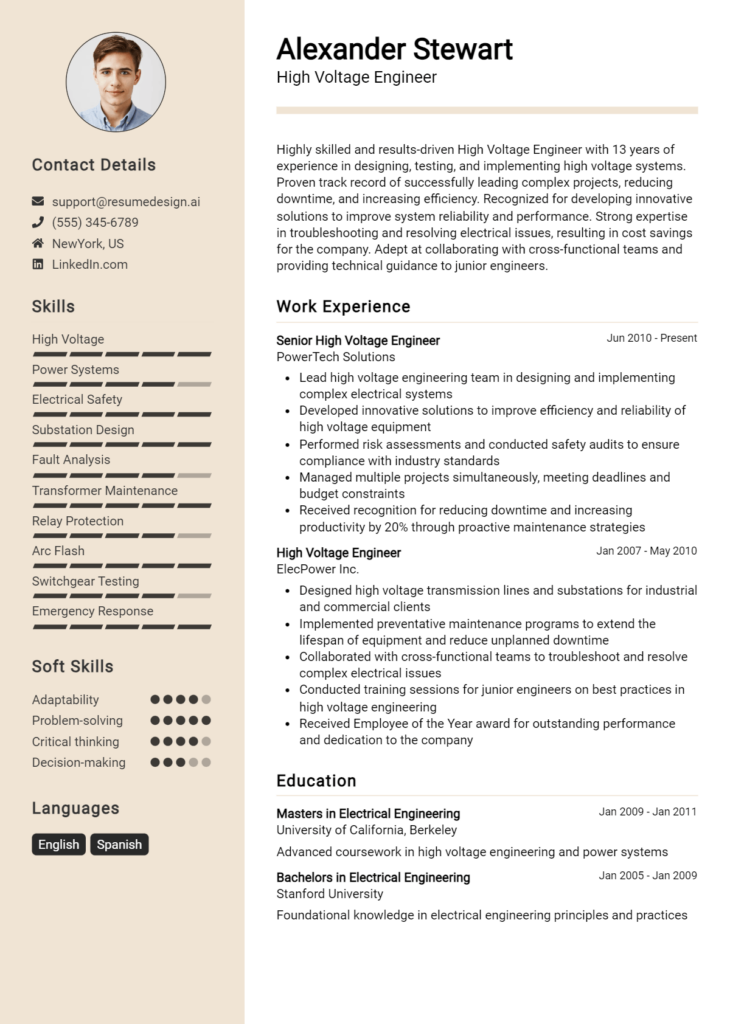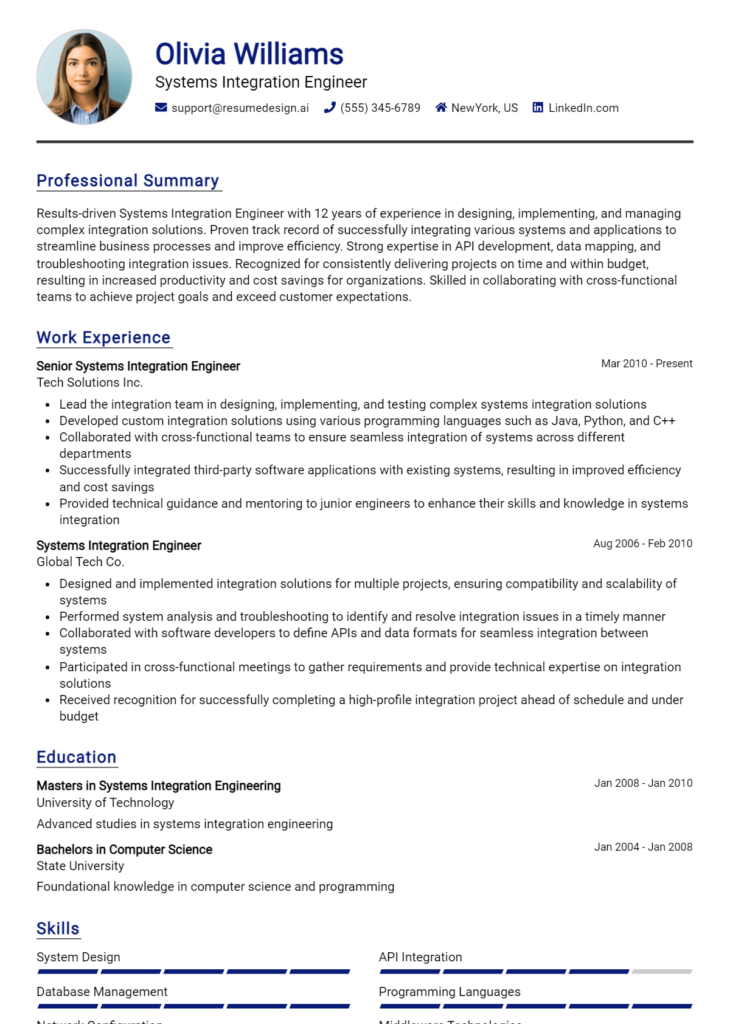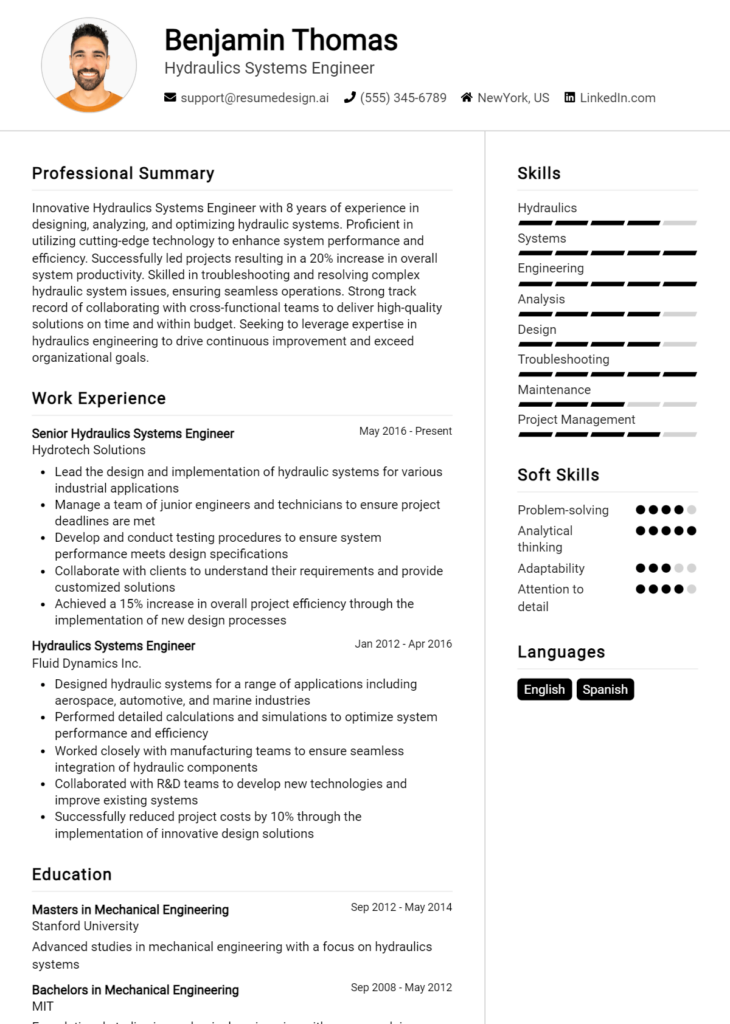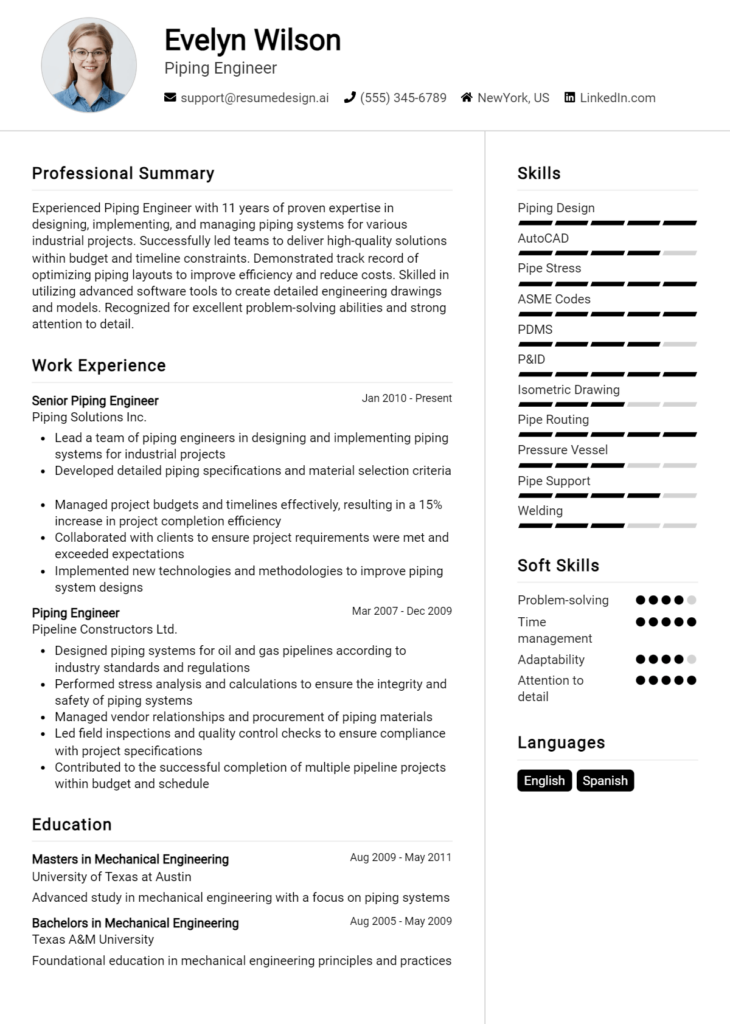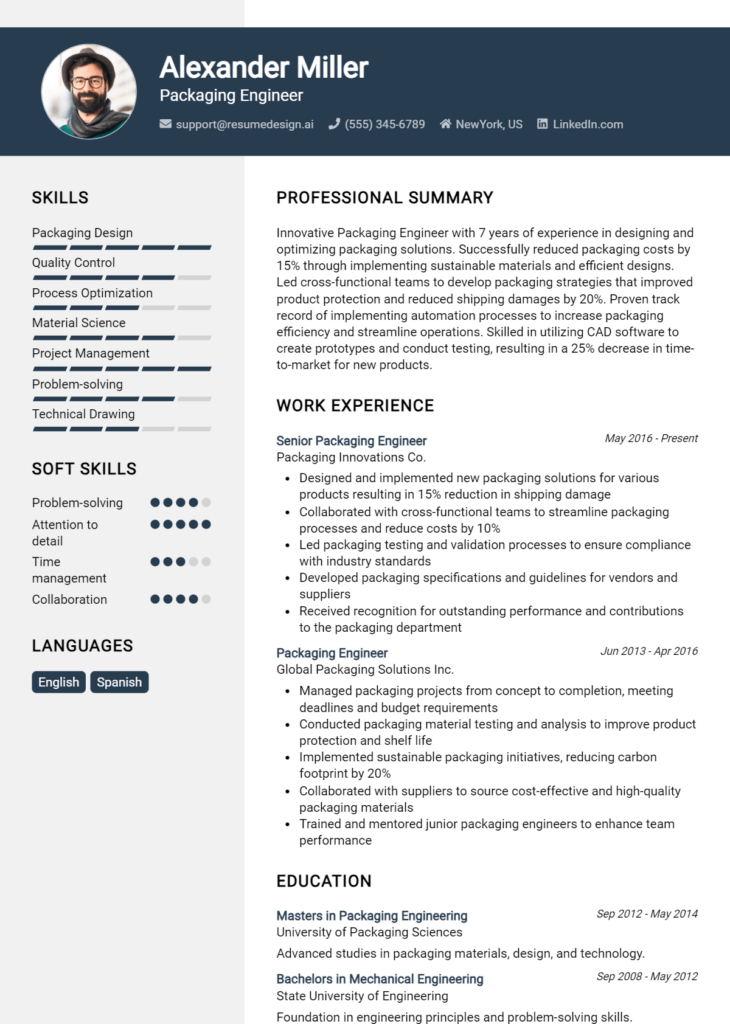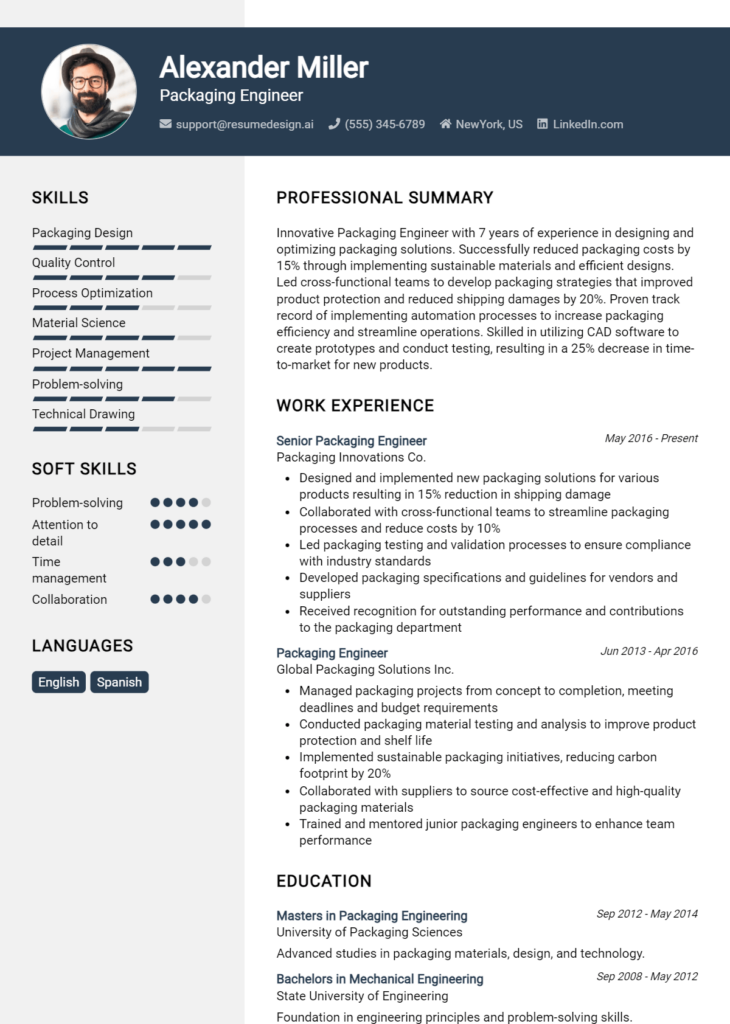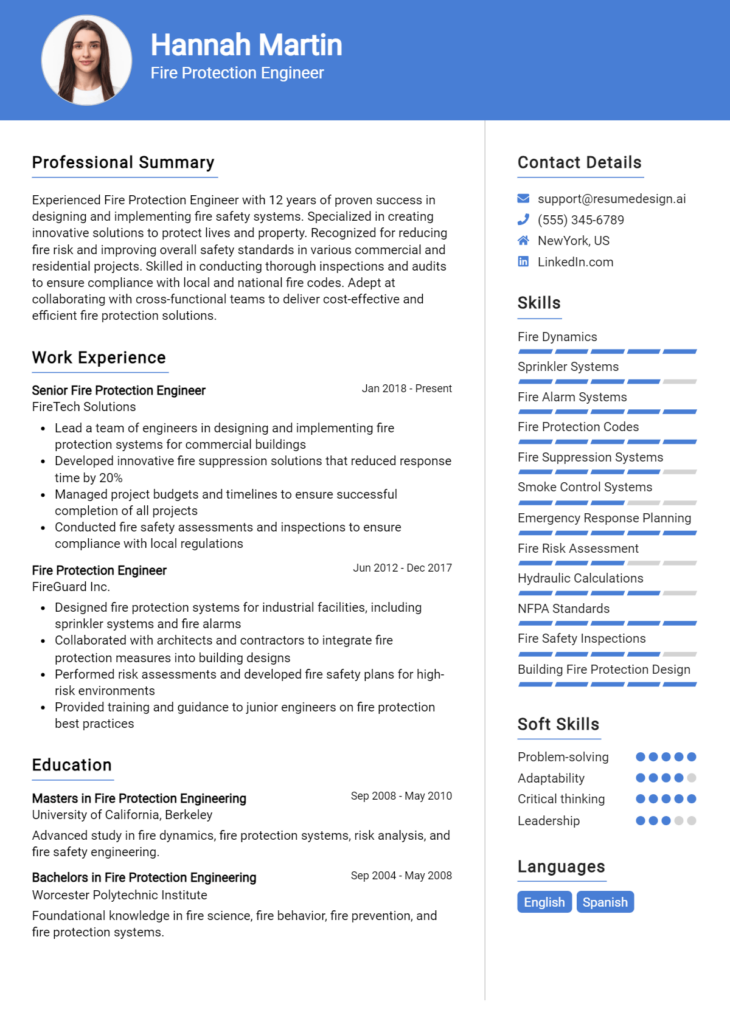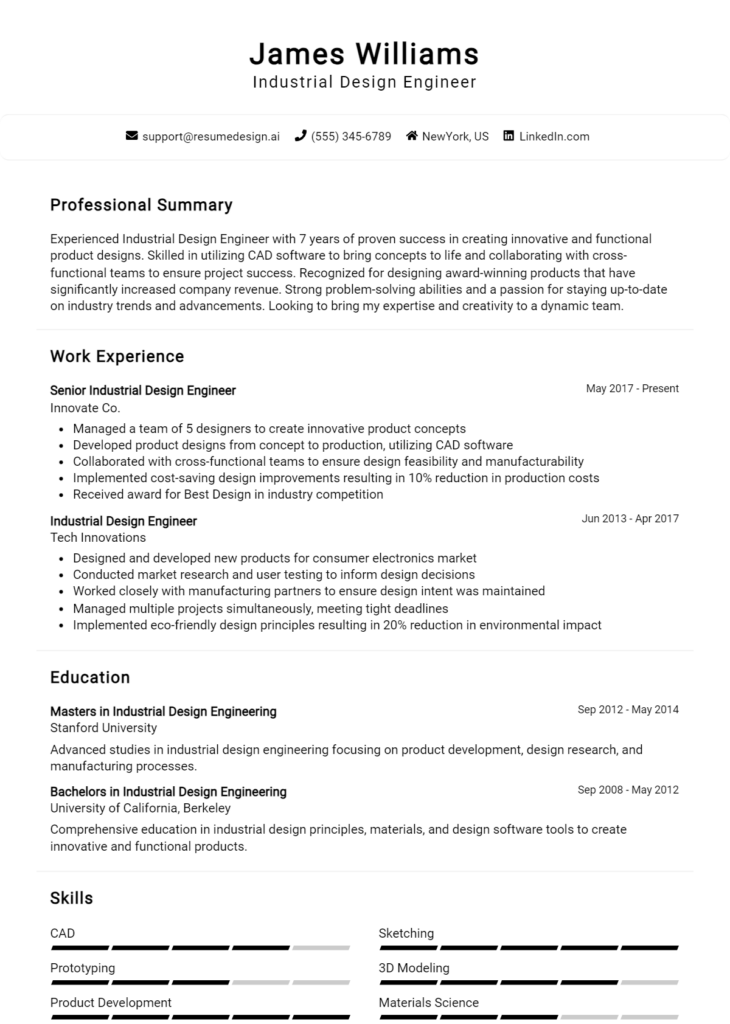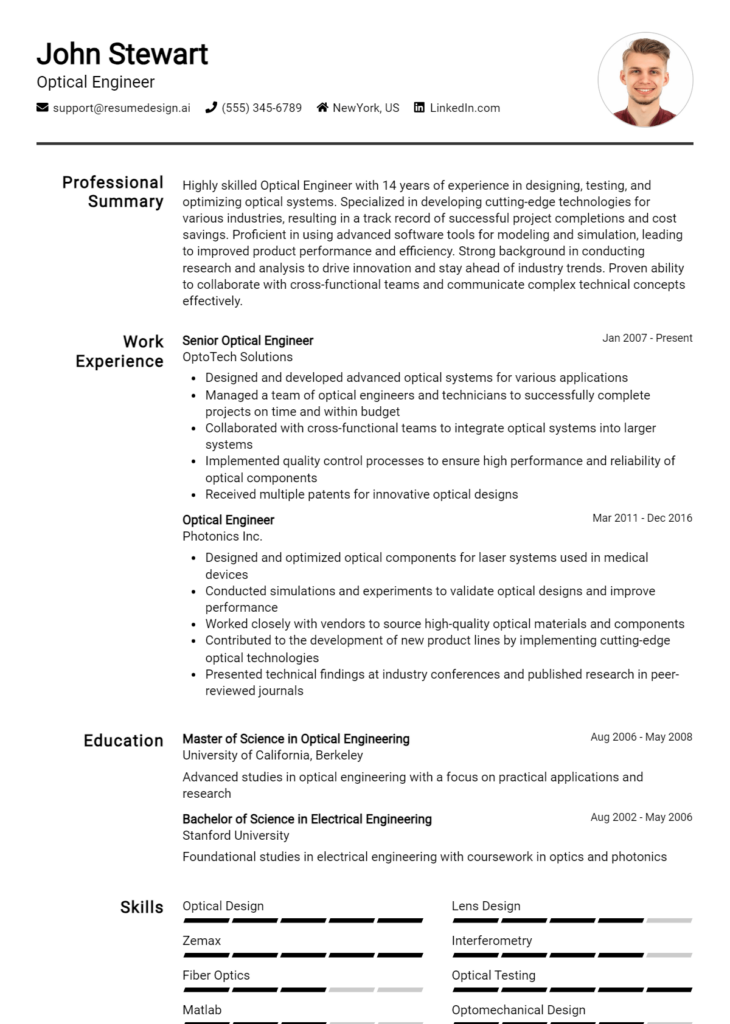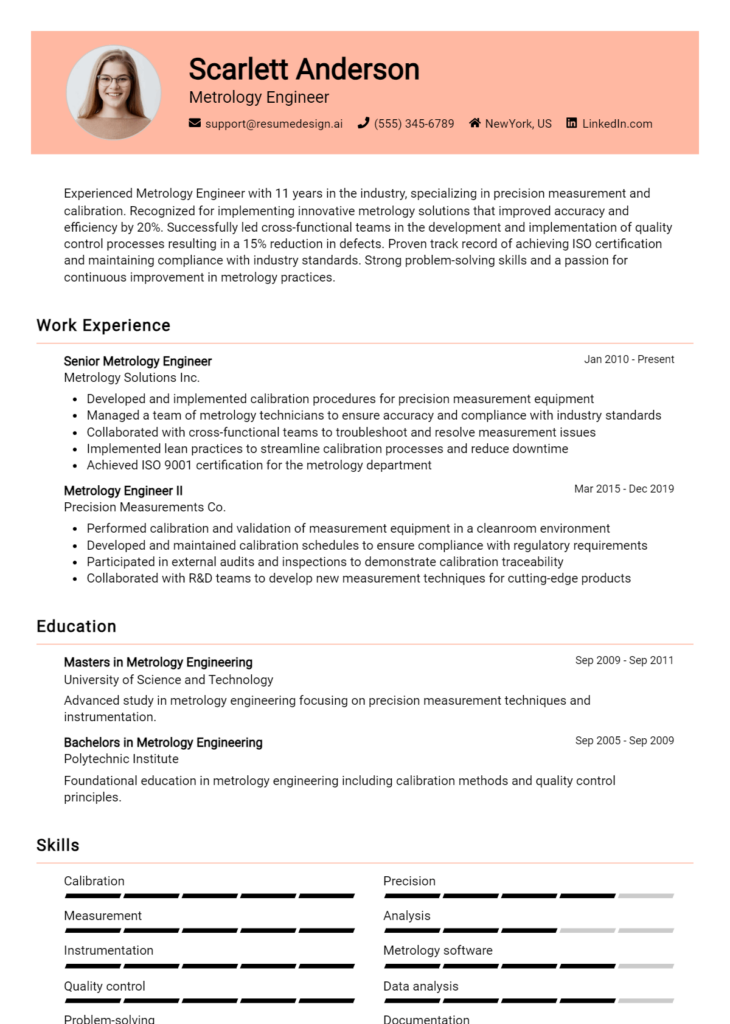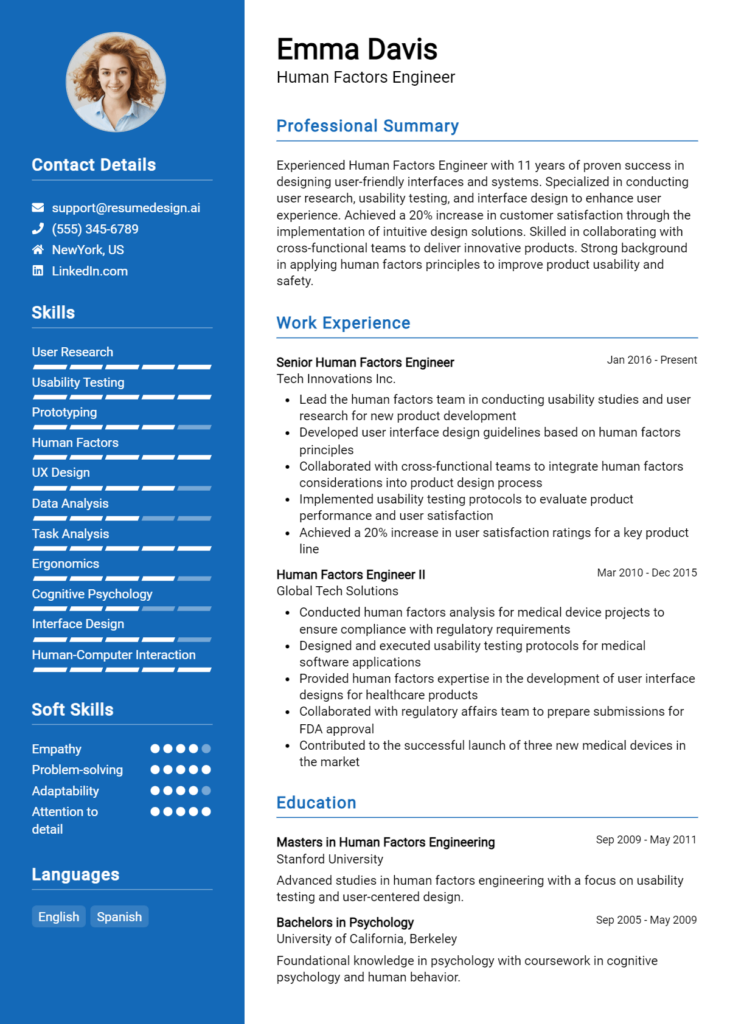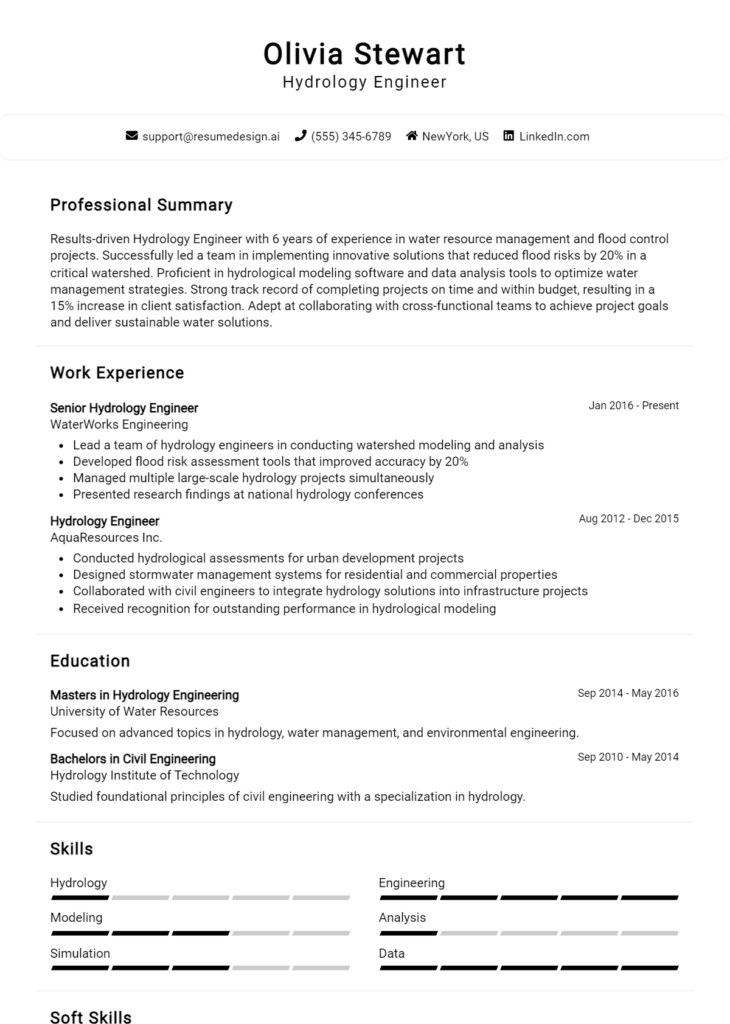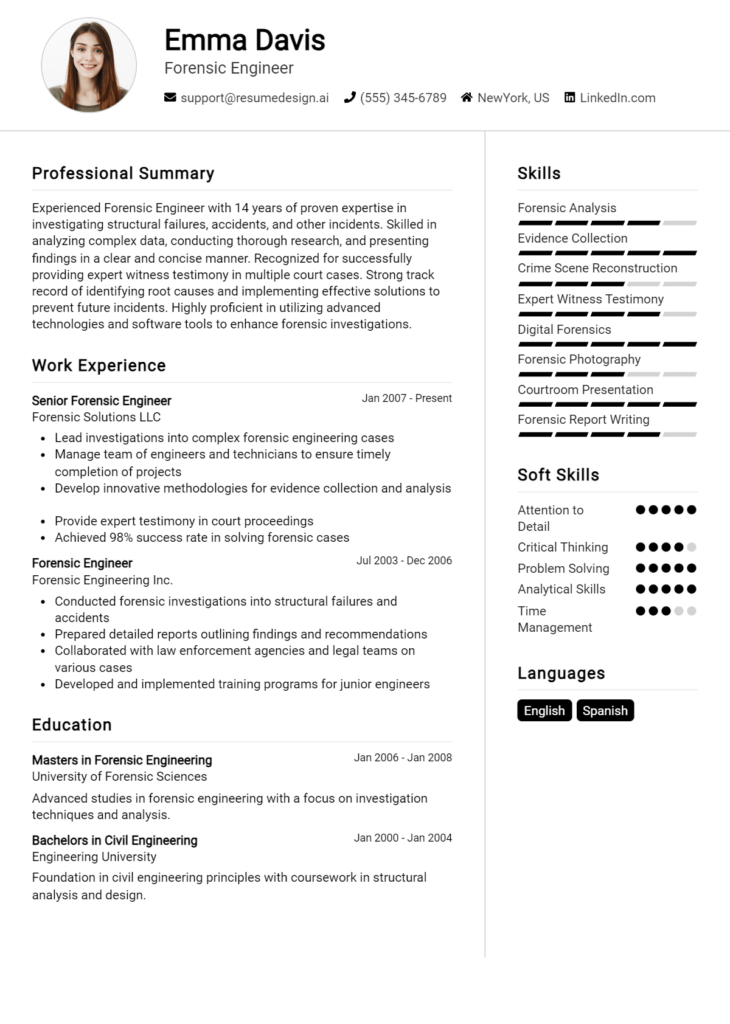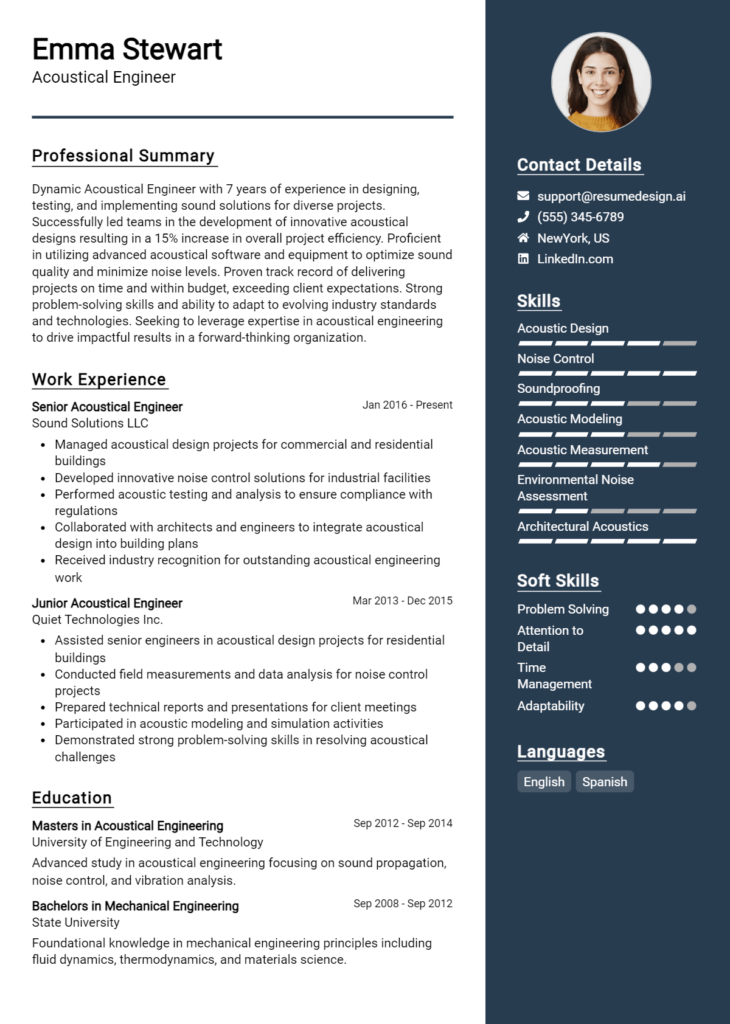Unmanned Systems Engineer Core Responsibilities
An Unmanned Systems Engineer plays a crucial role in the development, testing, and implementation of unmanned systems, such as drones and autonomous vehicles. This position requires a blend of technical, operational, and problem-solving skills to effectively collaborate across departments, including engineering, operations, and project management. A successful engineer in this field contributes to organizational goals by ensuring systems operate safely and efficiently. A well-structured resume can highlight these qualifications, showcasing the candidate's ability to bridge diverse functions and drive innovation.
Common Responsibilities Listed on Unmanned Systems Engineer Resume
- Design and develop unmanned systems and their components.
- Conduct testing and evaluation of unmanned technologies.
- Collaborate with cross-functional teams to integrate systems.
- Analyze data from unmanned systems to improve performance.
- Develop and maintain technical documentation and specifications.
- Ensure compliance with regulatory standards and safety protocols.
- Provide technical support and troubleshooting for operational issues.
- Participate in project planning and resource allocation.
- Stay updated on industry trends and advancements in technology.
- Train personnel on the operation and maintenance of unmanned systems.
- Implement software and hardware upgrades as necessary.
- Lead research initiatives to explore new applications for unmanned systems.
High-Level Resume Tips for Unmanned Systems Engineer Professionals
In the competitive field of unmanned systems engineering, a well-crafted resume serves as a crucial gateway to securing your dream job. It is often the first impression a potential employer has of you, making it essential that your resume effectively reflects both your skills and achievements. A strong resume not only highlights your technical expertise but also showcases your innovative contributions to the field. In this guide, we will provide practical and actionable resume tips specifically tailored for Unmanned Systems Engineer professionals, helping you to stand out in a crowd of candidates.
Top Resume Tips for Unmanned Systems Engineer Professionals
- Tailor your resume to match the job description, using keywords and phrases that reflect the specific requirements of the position.
- Focus on relevant experience, highlighting projects and roles that directly relate to unmanned systems engineering.
- Quantify your achievements where possible, using metrics to demonstrate the impact of your work (e.g., improved efficiency by 30%, reduced costs by $50,000).
- Highlight industry-specific skills such as programming languages (e.g., Python, C++), software tools (e.g., MATLAB, ROS), and systems integration knowledge.
- Include certifications and training relevant to unmanned systems engineering, showcasing your commitment to professional development.
- Demonstrate collaboration and teamwork skills, as many projects in this field require working closely with cross-functional teams.
- Incorporate a summary statement that encapsulates your career goals and key qualifications at the top of your resume.
- Utilize clear and concise language, avoiding jargon or overly technical terms that may not be understood by all hiring managers.
- Keep your resume visually appealing and easy to read, using bullet points and consistent formatting to guide the reader’s eye.
By implementing these tips, you can significantly increase your chances of landing a job in the Unmanned Systems Engineer field. A polished and targeted resume will not only present your qualifications effectively but also demonstrate your understanding of the industry, making you a more attractive candidate to potential employers.
Why Resume Headlines & Titles are Important for Unmanned Systems Engineer
In the rapidly evolving field of unmanned systems engineering, the competition for job opportunities is fierce. A well-crafted resume headline or title serves as the first impression for hiring managers, encapsulating a candidate's essential qualifications in a concise and impactful manner. By using a strong headline, candidates can grab attention and effectively summarize their expertise, making it easier for recruiters to quickly identify potential fits for the role. An effective headline should be concise, relevant, and directly aligned with the requirements of the job being applied for, ensuring that it resonates with the reader and sets the tone for the rest of the resume.
Best Practices for Crafting Resume Headlines for Unmanned Systems Engineer
- Be concise: Limit the headline to a single impactful phrase.
- Use role-specific language: Incorporate industry terminology relevant to unmanned systems engineering.
- Highlight key skills: Focus on the most relevant skills that align with the job description.
- Showcase accomplishments: If possible, include quantifiable achievements to demonstrate success.
- Tailor for each application: Customize the headline for the specific position being applied for.
- Avoid jargon: Use clear and straightforward language to ensure understanding.
- Make it compelling: Use powerful adjectives that convey expertise and professionalism.
- Keep it relevant: Ensure the headline relates directly to the role and responsibilities of an unmanned systems engineer.
Example Resume Headlines for Unmanned Systems Engineer
Strong Resume Headlines
Results-Driven Unmanned Systems Engineer with 7+ Years in Autonomous Vehicle Design
Innovative Unmanned Systems Specialist Skilled in UAV Development and Flight Operations
Certified Robotics Engineer with Extensive Experience in Drone Technology and Remote Sensing
Weak Resume Headlines
Engineer Seeking Opportunities
Unmanned Systems Professional
The strong headlines are effective because they clearly communicate the candidate's specific skills, experience, and accomplishments, making it easy for hiring managers to see their potential fit for the role. They provide a snapshot of the candidate’s qualifications that is both relevant and engaging. In contrast, the weak headlines fail to impress because they are vague and generic, lacking the specificity and impact needed to stand out in a competitive job market. Such titles do not convey any unique value or expertise, leaving hiring managers with little incentive to explore further.
Writing an Exceptional Unmanned Systems Engineer Resume Summary
A resume summary is a critical component for an Unmanned Systems Engineer, as it serves as an introduction that quickly captures the attention of hiring managers. In this competitive field, a strong summary effectively showcases key skills, relevant experience, and notable accomplishments that align with the job role. By providing a concise and impactful overview of what a candidate brings to the table, a well-crafted resume summary sets the tone for the rest of the application and can significantly enhance the chances of securing an interview. Tailoring the summary specifically to the job description further emphasizes the candidate's suitability for the position.
Best Practices for Writing a Unmanned Systems Engineer Resume Summary
- Quantify Achievements: Use numbers and metrics to demonstrate your impact, such as project completion rates, budget management, or efficiency improvements.
- Focus on Relevant Skills: Highlight technical skills and competencies that are directly applicable to the unmanned systems field, such as programming languages, systems integration, or regulatory compliance.
- Tailor for Each Job: Customize your summary for the specific job you are applying for, reflecting the language and key qualifications listed in the job description.
- Keep It Concise: Aim for 3-5 sentences that deliver a powerful message without being overly verbose.
- Showcase Industry Knowledge: Mention any relevant certifications, tools, or methodologies that demonstrate your expertise in unmanned systems engineering.
- Highlight Soft Skills: Include interpersonal skills, problem-solving abilities, or leadership experience to provide a well-rounded view of your qualifications.
- Use Strong Action Verbs: Start sentences with compelling action verbs to convey confidence and initiative.
- Proofread: Ensure there are no grammatical errors or typos, as these can detract from your professionalism.
Example Unmanned Systems Engineer Resume Summaries
Strong Resume Summaries
Dynamic Unmanned Systems Engineer with over 7 years of experience in designing and implementing advanced UAV systems. Successfully led a team to achieve a 30% increase in operational efficiency through innovative automation solutions, resulting in a $1M cost savings for the department.
Detail-oriented engineer with expertise in autonomous systems, having developed and deployed over 15 UAV platforms for environmental monitoring. Proven track record of managing projects under budget and ahead of schedule, with a 95% client satisfaction rate.
Results-driven Unmanned Systems Engineer with a Master’s degree in Aerospace Engineering and a strong background in software development for unmanned vehicles. Spearheaded a cross-functional team that reduced system malfunction rates by 40% through rigorous testing and quality assurance protocols.
Weak Resume Summaries
Experienced engineer looking for a position in unmanned systems. I have worked on various projects and have some skills in the field.
Skilled professional with a background in technology and engineering. I aim to contribute to a company's success in the unmanned systems sector.
The strong resume summaries are effective because they provide specific achievements, quantifiable results, and relevant skills that directly relate to the role of an Unmanned Systems Engineer. They showcase the candidate's unique contributions and expertise, making a compelling case for why they should be considered for the position. In contrast, the weak resume summaries lack detail, fail to quantify successes, and appear generic, which diminishes their impact and leaves hiring managers with little reason to take notice.
Work Experience Section for Unmanned Systems Engineer Resume
The work experience section of a Unmanned Systems Engineer resume is pivotal in demonstrating a candidate's technical acumen and their ability to lead teams in the development and deployment of unmanned systems. This section not only highlights specific skills and projects but also underscores the candidate's capacity to deliver high-quality products that meet industry standards. By quantifying achievements and aligning their experiences with the expectations of the unmanned systems field, candidates can effectively illustrate their value to potential employers and set themselves apart from the competition.
Best Practices for Unmanned Systems Engineer Work Experience
- Focus on technical skills relevant to unmanned systems, such as programming languages, software tools, and control systems.
- Quantify achievements with specific metrics, such as project completion rates, cost savings, or performance improvements.
- Highlight leadership experiences, including managing teams, mentoring junior engineers, or leading cross-functional projects.
- Showcase collaboration with other departments, stakeholders, or clients to emphasize teamwork and communication skills.
- Use industry-specific terminology to demonstrate familiarity with standards and practices in unmanned systems engineering.
- Tailor each experience to align with the job description, focusing on relevant tasks and accomplishments.
- Include any relevant certifications, training, or licenses that bolster your qualifications.
- Keep descriptions concise yet impactful, ensuring clarity and readability for hiring managers.
Example Work Experiences for Unmanned Systems Engineer
Strong Experiences
- Led a team of 5 engineers in the design and implementation of an autonomous drone system, resulting in a 30% increase in operational efficiency and a 25% reduction in costs over the project lifespan.
- Developed and optimized flight control algorithms that improved stability and performance, achieving a 15% increase in payload capacity and a 20% reduction in energy consumption.
- Collaborated with cross-disciplinary teams to integrate advanced sensor technologies into unmanned vehicles, enhancing data collection capabilities by 40% and receiving positive feedback from end-users.
- Managed the successful completion of a $2 million unmanned systems project ahead of schedule, which led to a contract extension and additional funding for further development.
Weak Experiences
- Worked on various projects related to drones and unmanned systems.
- Assisted senior engineers with tasks and projects.
- Involved in team meetings and discussions regarding unmanned vehicle development.
- Helped in testing systems to ensure they worked properly.
The examples provided illustrate the difference between strong and weak work experiences. Strong experiences are characterized by specific, quantifiable outcomes that reflect technical leadership and collaboration, showcasing the candidate's direct impact and expertise. In contrast, weak experiences lack detail and measurable achievements, rendering them less impressive and failing to convey the candidate's true capabilities in the field of unmanned systems engineering.
Education and Certifications Section for Unmanned Systems Engineer Resume
The Education and Certifications section of an Unmanned Systems Engineer resume plays a critical role in establishing the candidate's qualifications and suitability for the position. This section not only showcases the candidate's academic background but also highlights industry-relevant certifications and ongoing commitment to professional development. By providing relevant coursework, recognized certifications, and specialized training, candidates can significantly enhance their credibility and demonstrate their alignment with the specific demands of the Unmanned Systems Engineering role. A well-crafted education and certifications section can effectively convey the candidate's technical expertise and readiness to contribute to the field.
Best Practices for Unmanned Systems Engineer Education and Certifications
- Prioritize relevance by including degrees and certifications directly related to unmanned systems and engineering.
- Provide specific details about your education, including the name of the institution, degree earned, and graduation date.
- Highlight any advanced degrees, such as Master's or PhD, which can set you apart from other candidates.
- List industry-recognized certifications that demonstrate your proficiency in unmanned systems technologies.
- Include relevant coursework that showcases specialized knowledge and skills pertinent to the role.
- Keep the information current by removing outdated or irrelevant certifications or degrees.
- Use bullet points for clarity and ease of reading, ensuring that the most important qualifications stand out.
- Consider including ongoing education efforts, such as workshops or seminars, to illustrate your commitment to continuous learning.
Example Education and Certifications for Unmanned Systems Engineer
Strong Examples
- Bachelor of Science in Unmanned Systems Engineering, University of XYZ, Graduated May 2021
- Certified Autonomous Systems Engineer (CASE), Autonomous Systems Institute, Certified June 2022
- Relevant Coursework: Robotics, Control Systems, Flight Dynamics, and Sensor Integration
- Master's Degree in Electrical Engineering with a focus on Robotics, University of ABC, Expected May 2024
Weak Examples
- Bachelor of Arts in History, University of DEF, Graduated May 2019
- Certification in Basic First Aid, Red Cross, Certified January 2020
- Online Course in Social Media Marketing, Completed August 2021
- High School Diploma, XYZ High School, Graduated June 2015
The strong examples are considered effective because they align directly with the requirements of the Unmanned Systems Engineer role, showcasing relevant degrees, certifications, and coursework that demonstrate a solid foundation in the field. In contrast, the weak examples lack relevance and do not support the candidate's qualifications for a technical engineering position, instead focusing on unrelated fields or outdated credentials that do not enhance their profile as an Unmanned Systems Engineer.
Top Skills & Keywords for Unmanned Systems Engineer Resume
In the rapidly evolving field of unmanned systems, possessing the right skills is crucial for success as an Unmanned Systems Engineer. A well-crafted resume that highlights both hard and soft skills can significantly enhance your candidacy, demonstrating your technical proficiency and your ability to collaborate effectively in multidisciplinary teams. Employers look for candidates who not only have the technical knowledge but also the interpersonal skills necessary to navigate complex projects and communicate ideas clearly. Showcasing these skills in your resume can make a lasting impression and set you apart in a competitive job market.
Top Hard & Soft Skills for Unmanned Systems Engineer
Soft Skills
- Problem-solving
- Communication
- Team collaboration
- Adaptability
- Critical thinking
- Attention to detail
- Project management
- Time management
- Creativity
- Leadership
Hard Skills
- Proficiency in programming languages (e.g., C++, Python, MATLAB)
- Knowledge of sensor integration
- Experience with autonomous systems design
- Familiarity with control systems and algorithms
- Understanding of robotics and AI
- UAV (Unmanned Aerial Vehicle) operation and maintenance
- Experience with simulation software
- Data analysis and interpretation
- System testing and validation
- Project lifecycle management
For a comprehensive overview of how to effectively present your skills and work experience, consider tailoring your resume to emphasize the most relevant abilities and experiences that align with the specific job description.
Stand Out with a Winning Unmanned Systems Engineer Cover Letter
Dear Hiring Manager,
I am writing to express my interest in the Unmanned Systems Engineer position at [Company Name], as advertised on [Where You Found the Job Listing]. With a strong background in engineering and a passion for innovative unmanned systems technology, I am excited about the opportunity to contribute to your team and support the development of cutting-edge solutions in this rapidly evolving field. My experience with drone design, autonomous systems, and software integration positions me well to make a significant impact at [Company Name].
In my previous role at [Previous Company Name], I successfully led a team in the design and implementation of a multi-vehicle coordination system for unmanned aerial vehicles (UAVs). This project not only improved operational efficiency by 30% but also enhanced the reliability of our systems in complex environments. My technical expertise in control systems, embedded programming, and sensor integration has equipped me with the knowledge needed to address the unique challenges faced in unmanned systems engineering. I am particularly drawn to [Company Name] because of its commitment to innovation and safety in unmanned technology, and I am eager to bring my skills to your esteemed organization.
Collaboration is at the heart of successful engineering projects, and I pride myself on my ability to communicate effectively with cross-functional teams. I have a proven track record of working closely with software developers, mechanical engineers, and project managers to ensure seamless integration of systems and successful project outcomes. I am excited about the prospect of leveraging my collaborative approach to contribute to [Company Name]'s projects and help push the boundaries of what unmanned systems can achieve.
Thank you for considering my application. I look forward to the opportunity to discuss how my background, skills, and enthusiasm for unmanned systems engineering align with the goals of [Company Name]. I am eager to bring my innovative spirit and technical expertise to your team and help drive the future of unmanned technology.
Sincerely,
[Your Name]
[Your Phone Number]
[Your Email Address]
Common Mistakes to Avoid in a Unmanned Systems Engineer Resume
When crafting a resume for the role of an Unmanned Systems Engineer, it's crucial to avoid certain common pitfalls that can undermine your qualifications and experience. A well-structured resume should not only highlight your technical skills but also effectively communicate your ability to work within the multidisciplinary environment that unmanned systems often require. Here are several mistakes to steer clear of:
Vague Objective Statements: Using a generic objective that does not specify your goals related to unmanned systems can make your resume blend in with others. Tailor your objective to highlight your specific interests and strengths in the field.
Overloading with Technical Jargon: While it's important to demonstrate your technical expertise, overloading your resume with jargon can alienate hiring managers who may not be familiar with every technical term. Aim for clarity and balance between technical terms and understandable language.
Neglecting Soft Skills: Focusing solely on technical skills without mentioning soft skills like teamwork, problem-solving, and communication can present you as one-dimensional. Unmanned Systems Engineers often collaborate on complex projects; showcasing these skills is essential.
Lack of Quantifiable Achievements: Simply stating responsibilities without quantifying your accomplishments can diminish the impact of your experience. Use specific metrics and outcomes, such as "improved system efficiency by 20% through process optimization."
Ignoring Relevant Certifications: Failing to mention relevant certifications, such as those from the Association for Unmanned Vehicle Systems International (AUVSI), can overlook a crucial aspect of your qualifications. Certifications can validate your expertise and commitment to the field.
Inconsistent Formatting: A resume with inconsistent formatting can appear unprofessional and distract from your content. Ensure uniformity in font sizes, bullet points, and headings to create a polished look.
Omitting Relevant Projects: Leaving out significant projects or work experiences related to unmanned systems can weaken your resume. Listing specific projects not only showcases your hands-on experience but also highlights your practical application of skills.
Using a One-Size-Fits-All Approach: Submitting the same resume for every job application can be detrimental. Tailor your resume for each position by emphasizing the most relevant experiences and aligning your skills with the job description.
Conclusion
As an Unmanned Systems Engineer, your role is critical in the development and implementation of autonomous technologies that are transforming industries from defense to agriculture. Throughout this article, we explored the essential skills required for this position, including proficiency in robotics, software programming, and systems integration. We also discussed the importance of staying updated with the latest technological advancements and certifications relevant to unmanned systems.
In addition, we highlighted the significance of showcasing your unique experiences and qualifications in your resume to stand out in a competitive job market. Crafting a well-structured resume tailored to the Unmanned Systems Engineer role can greatly enhance your chances of landing an interview.
Now is the perfect time to review your Unmanned Systems Engineer resume and ensure it reflects your skills and experiences effectively. To assist you in this process, consider utilizing helpful resources such as resume templates, a user-friendly resume builder, and a variety of resume examples to inspire your design. Don't forget to enhance your application with a professional cover letter template that complements your resume. Take action today and elevate your job application to the next level!

